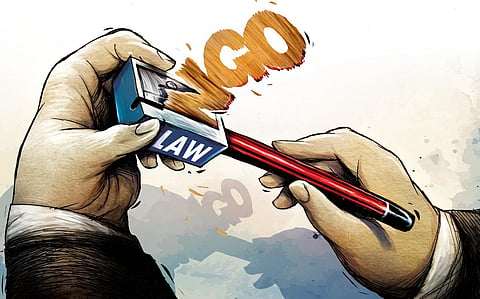

All over the world, the influence of civil society organisations, popularly known as NGOs, is increasing. However, their credibility seems to be going south. Undoubtedly, this is disheartening but not altogether unexpected.
Not too long ago in 2018, a report by Carnegie Endowment for International Peace succinctly pointed out how civil society is perceived globally. The report stressed on some key observations and the most important among them were:
a) That civil society organisations are self-appointed rather than elected, and thus do not represent the popular will.
b) That civil society organisations receiving foreign funding are accountable to external rather than domestic constituencies and advance foreign rather than local agendas.
c) That civil society groups are elite actors who are not representative of the people they claim to represent. Critics point to the foreign education backgrounds, high salaries, and frequent foreign travel of civic activists to portray them as out of touch with the concerns of ordinary citizens and only working to perpetuate their own privileged lifestyle.
In a changing world where crass individualism is hugely contributing towards the fragmentation of society, the spirit of voluntarism that presupposes effective collective action was bound to decline. Seen against this backdrop, India’s presidency of C20 (Civil Society 20)—an engagement group of the G20—provides us with an opportunity to influence global discourse around civil societies and help the ‘third sector’ restore its credibility.
To start with, Indian philosophy serves as an anchor for our approach to voluntarism. The Bhagavad Gita tells us that there are at least four prerequisites to accomplish any mission besides good fortune which comes in the end. These include adhishthan or philosophy, a karta or a doer who leads from the front, a variety of programmes and lastly, diverse efforts in multiple ways. This precludes any kind of straight jacketing. This manifests our core democratic principle of celebrating diversities and pluralism, and our foundational understanding of the doctrine “let a thousand flowers bloom.”
India hosting C20 is also important because the authentic civil society concept in India is intertwined with the spirit of voluntarism. The Indian worldview was always centred around the idea of an autonomous society. To put it bluntly, the universally popular notion of NGOs is incongruent with the Indian ethos as it puts the government at the centre and not society. In India, collective action has always been the key to emancipation. Our civilisational culture had always recognised individuality. We knew “pinde pinde matirbhinna”, but then we also realised the importance of “Om saha navavatu, saha nau bhunaktu, saha viryam karavavahai…”
Our basic philosophical approaches have always struck a fine balance between individualism and collective spirit. It is because of this that Indian civil societies traditionally aspire to become movements—of the people, by the people, for the people—and not fiefdoms of individuals.
Voluntary work, as envisioned by the Indian philosophy, is inspired by a sense of indebtedness towards society at large. Our ancient scriptures like the Upanishads also explain the importance of daan as duty and as part of repaying societal debt. Our scriptures also refer to shram-daan, anna-daan, vastra-daan and gyan-daan.
Transformational social work carried out by Savitribai Phule, Mahatma Gandhi, Ishwar Chandra Vidyasagar, B R Ambedkar, Vinoba Bhave, Eknath Ranade, Baba Amte, Sunderlal Bahuguna, Nanaji Deshmukh, among others are important examples of these teachings.
Notably, India’s freedom struggle, too, was a scintillating example of voluntarism. People voluntarily participated and there were several avenues for them to associate with the struggle. Importantly, Tilak, Gandhi, Ambedkar and Savarkar—all practised law, ran newspapers, and established organisations for nationalistic education, public awakening and popular mobilisation. However, what was strikingly common among most of the key freedom fighters was their emphasis on practising what they were all preaching. This had largely prevented hypocrisy from overtaking voluntarism.
Civil society organisations in the development sector, more commonly known as NGOs, gained prominence when the implementation of the ideal welfare state even under a democratic government continued to be challenging. Wherever and whenever government organisations failed, NGOs made an entry. Unlike bureaucrats and government functionaries, NGOs were considered to be more driven by idealism and commitment. But more often than not, this proved to be a chimaera. NGOs apparently became ultra-professional and excessively business-like. With this, the spirit of voluntarism dissipated, a sense of mission became a thing of the past, and passion became short-lived. Some NGOs became family-controlled businesses.
For their very survival, some of the NGOs started looking for issues and became—what PM Modi had rightly described—Andolan Jeevi. In the process, the touch with both team members and ground realities vanished. All this resulted in the loss of credibility of many voluntary organisations. The public at large started doubting their intentions as transparency, democratic functioning and accountability became a far cry in many cases.
Concerns about the very credibility of civil society and NGOs are a universal phenomenon. Issues like human rights, sustainability, gender justice, etc. are no doubt universally important. Civil society is supposed to find solutions to all of them. But, when legitimate concerns are raised about the solution-finder itself, Indian civil society organisations must come forward and provide models where unethical practices masquerading as professionalism are prevented from eating into the vitals of purity of purpose and spirit of voluntarism.
To make this happen, it would be better if C20 host India also deliberates on saving the saviour, that is, the civil society organisations, before they continue to lose credibility. A self-regulatory mechanism that defines a healthy relationship between civil society and the government and lays down clearly stated dos and don’ts, thereby setting high standards of democratic functioning and accountability, could certainly be a way to go. To start with, C20 can perhaps do well to hold a mirror to civil society and come out with a ‘Universal Charter of Reforms’ for itself.
Vinay Sahasrabuddhe
President, ICCR and senior BJP leader